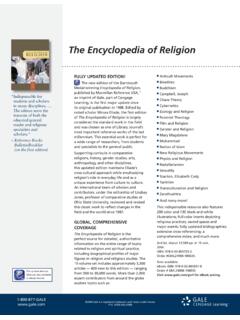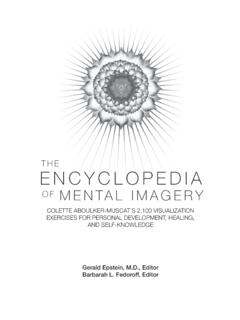Transcription of Jewish Encyclopedia entry on Zionism 1906 - Emory University
1 Jewish Encyclopedia The History, Religion, Literature, And Customs Of The Jewish People From The Earliest Times To The Present Day Volume XII TALMUD ZWEIFEL New York and London FUNK AND WAGNALLS COMPANY MDCCCCVI Zionism : Movement looking toward the segregation of the Jewish people upon a national basis and in a particular home of its own: specifically, the modern form of the movement that seeks for the Jews a publicly and legally assured home in Palestine, as initiated by Theodor Herzl in 1896, and since then dominating Jewish history. It seems that the designation, to distinguish the movement from the activity of the Chovevei Zion, was first used by Matthias Acher (Birnbaum) in his paper Selbstemancipation, 1886 (see Ost und West, 1902, p.)
2 576: Ahad ha Am, Al Parashat Derakim, p. 93, Berlin, 1903). Biblical Basis The idea of a return of the Jews to Palestine has its roots in many passages of Holy Writ. It is an integral part of the doctrine that deals with the Messianic time, as is seen in the constantly recurring expression, shub shebut or heshib shebut, used both of Israel and of Judah (Jer. xxx, 7,1; Ezek. Xxxix. 24; Lam. Ii. 14; Hos. Vi. 11; Joel iv. 1 et al.). The Dispersion was deemed merely temporal: The days come .. that .. I will bring again the captivity of my people of Israel, and they shall build the waste cities and inhabit them; and they shall plant vineyards, and drink the wine thereof.
3 And I will plant them upon their land, and they shall no more be pulled up out of their land (Amos ix. 14; comp. Zeph. Iii. 20); and I will bring them again also out of the land of Egypt, and gather them out of Assyria; and I will bring them into the land of Gilead and Lebanon (Zech. X. 10; comp. Isa. xi. 11). In like strain the Psalmist sings, O that the salvation of Israel were come out of Zion! When the Lord bringeth back the captivity of his people, Jacob shall rejoice, and Israel shall be glad: (Ps. xiv. 7; comp. cvii. 2,3) According to Isaiah (ii. 1-4) and Micah ( , Jerusalem was to be a religious center from which the Law and the word of the Law were to go forth.)
4 In a dogmatic form this doctrine is more precisely stated in Deut. Xxx. 1-5. Relation to Messianism The belief that the Messiah will collect the scattered hosts is often expressed in Talmudic and Midrashic writings; even though more universalistic tendencies made themselves felt, especially in parts of the Apocryphal literature (see Jew. Encyc. viii. 507, MESSIAH ). Among Jewish philosophers the theory held that the Messiah b. Joseph will gather the children of Israel around him, march to Jerusalem, and there, after overcoming the hostile powers, reestablish the Temple worship and set up his own dominion (ib. p. 511b). This has remained the doctrine of Orthodox Judaism; as Friedl nder expresses it in his Jewish Religion (p.)
5 161): There are some theologians who assume the Messianic period to be the most perfect state of civilization, but do not believe in the restoration fo the kingdom of David, the rebuilding of the Temple, or the repossession of Palestine by the Jews. They altogether reject the national hope of the Jews. These theologians either misinterpret or wholly ignore the teachings of the Bible and the divine promises made through the men of God. The Reform wing of the Synagogue, however, rejects this doctrine; and the Conference of Rabbis that sat in Frankfort-on-the-Main July 15-28,1845, decided to eliminate from the ritual the prayers for the return to the land of our forefathers and for the restoration of the Jewish state.
6 The Philadelphia Conference, Nov. 3-6, 1869, adopted as the first section of its statement of principles the following; The Messianic aim of Israel is not the restoration of the old Jewish state under a descendant of David, involving a second separation from the nations of the earth, but the union of all the children of God in the confession of the unity of God, so as to realize the unity of all rational creatures, and their call to moral sanctification. Rejected by Reform Judaism This was reaffirmed at the Pittsburg Conference, Nov. 16-18, 1885, in the following words: We consider ourselves no longer a nation, but a religious community; and we therefore expect neither a return to Palestine, nor a sacrificial worship under the sons of Aaron, nor the restoration of any of the laws concerning a Jewish state.
7 Historically, the hope of a restoration, of a renewed national existence, and of a return to Palestine has existed among the Jewish people from olden times. After the first Exile, the Jews in Babylonia looked forward continually to the reestablishment of their ancient kingdom. However much the Jews spread from land to land, and however wide the dispersion and consequent Diaspora became, this hope continued to burn brightly; and from time to time attempts were made to realize it. The destruction fo the Temple by Titus and Vespasian (70 ) was perhaps the most powerful factor in driving the Jews east, south, and west. Nevertheless, in a short time the hope of a restoration was kindled anew.
8 The risings under Akiba and Bar Kokba (118) soon followed; and the Jews drenched the soil of Palestine with their blood in the vain attempt to regain their national freedom against the heavy hand of the Roman power. Despite these checks, the idea of the restoration persisted and became a matter of dogmatic belief, as such it finds expression in Jewish literature, both prose and poetic. The Talmudic writings as a whole, while making suitable provision for the actual circumstances under which the Jews lived, are based upon the idea that at some time the ancient order of things will be reestablished, and the old laws and customs come again into vogue. These hopes found expression in numerous prayers which from time to time were inserted in the ritual.
9 In Talmudic Times Various calculations were made as to when this time would arrive, , in the eighth century (Revelations of R. Simeon b. Yohai ) and in the eleventh century (Apoc. Zerubbabel; see Zunz, Erl sungsjahre, in iii. 224; Poznanski in Monatsschrift, 1901). The idea was given a philosophic basis by those who treated of Jewish theology. And the singers, both of the Synagogue and the home, were fervid in their lament for the glory that was past and in their hopes for the dignity that was to come (see ZIONIDES). But the outward condition in which the Jews lived so many centuries made it impossible for them to think of realizing in fact that which they hoped and prayed for.
10 The supernatural accessories with which theology had clothed the idea of the restoration also palsied any effort that might have been made. The Deity was supposed to lead the way; and the hand of man remained inert. From time to time, it is true, individual Jews or bands of Jews journeyed to Palestine, there either to lay their bones in sacred soil or to await the coming of the Messiah (see PILGRIMAGE). Only fitfully and at periods far distant from one another was any attempt made to anticipate Providence and to venture such a restoration on a practical basis. And even in such cases it was not always Palestine that was selected for the first attempt, because of the practical difficulties which were known to inhere in any such a scheme.










